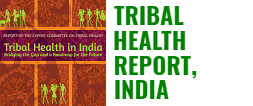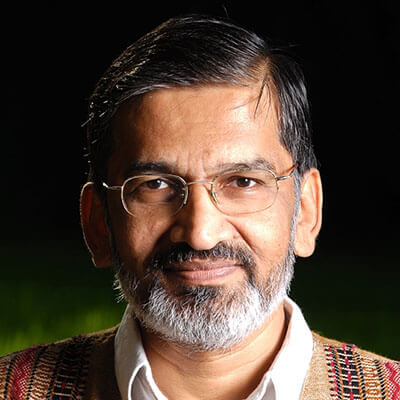The Expert Committee on Tribal Health was constituted jointly by the Ministry of Health & Family Welfare and the Ministry of Tribal Affairs, Government of India in 2013. Why?
The Constitution of India recognizes the special status of tribal people – the Scheduled Tribes – and provides safeguards to protect their rights and culture. However, despite their large number, (104 million according the Census, 2011), tribal people have remained marginal – geographically, socio-economically, politically, and therefore, in the national psyche. For the mainstream population, the tribals are ‘those semi-naked wild people who live somewhere in the forests and mountains, and who sometimes appear in the news because their children are malnourished’.
Though it has long been suspected that tribal people have poor health and unmet needs, health care for tribal people remained subsumed in rural health care. It was assumed that tribal people have same health problems, similar needs and hence the uniform national pattern of rural health care would be applicable to them as well, albeit with some alteration in population: provider ratio. The different terrain and environment in which they live, different social systems, different culture and hence different health care needs were not addressed. Not surprisingly health and healthcare in tribal areas remained unsolved problems. But how would the nation know? No separate data on tribal health were maintained. That permitted a blissful unawareness of tribal health.
It is creditable that the two ministries of Government of India recognized that sixty six years after independence and after eleven five year plans, we need to view tribal people’s health as a serious and special concern. Hence this committee, the first such endeavour, was constituted to answer two questions 1) What is the present status of health and health care in tribal areas and why the gap? 2) What should be the roadmap for the future to bridge this gap rapidly.
The Expert Committee on Tribal Health has approached this task in four stages.
- What is the evidence and experience on the present status of health of the tribal people and health care, leading to formulation of Diagnosis of Tribal Health.
- What should be the principles and goals of tribal healthcare?
- How should the health care delivery and human resources be organized in tribal areas?
- The finances, governance and knowledge required to support the above.
It proved to be a most challenging work. To our dismay we found that not only separate data on tribal population’s health, health care, and finances were not available, even the institutional mechanisms to generate such data did not exist or did not function. The darkness of information was astounding. For example, nobody knew what was Infant Mortality Rate in tribal population or how much money was spent on tribal health.
This report succeeds in collating such information hidden in various databases or studies, analyzing and interpreting it and constructing the first comprehensive picture of tribal health and health care in India. Though several gaps remain, what has been accomplished is valuable and eye opener. We found that the tribal people suffer from a ‘triple burden of disease’. Their health status has significantly improved over the past 25 years, and yet, it is worst as compared to other social groups. We found that the health care services in tribal areas, apart from being deficient in number, quality and resources, suffer from major design problems of inappropriateness to tribal society and lack of participation. Part one of the report is devoted to this inquiry, culminating in to the Diagnosis of Tribal Health.
Part two presents the solutions and roadmap for the future. Through a consultative process – with the experts, officers, researchers, civil society organizations, and with the representatives of tribal people, and by organizing a national workshop to identify potential solutions, by inviting suggestions online, by reviewing the evidence from other countries and finally, by searching for ideas and examples from the ongoing work of NGOs in tribal areas and other reports, we have formulated a roadmap for the future. Beginning with identifying the principles of tribal healthcare we propose the goal that the health status of tribal people in India should be brought on par with the rest of the population in the next ten years.
Universal Health Care (UHC) and Universal Health Assurance (UHA) are now accepted principles of India’s government policy. We propose that, in the spirit of Antyodaya and the constitutional promise to tribal people, the implementation of UHC or UHA in India should urgently begin with the tribal populations. We have suggested a health care delivery pattern and a governance structure. We also visualise the necessary human and financial resources and the way to mobilize. The good news is that within the limits of the national guidelines of Tribal Sub Plan and of the National Health Policy (2016), it is possible to finance tribal health care.
This report is an output of four years of work of the Committee. I must say that this Committee included individuals of exceptional quality with expertise, experience, authority and diversity. This report is a product made possible due to pooling of their efforts.
I wish to thank the Ministry of Health and Family Welfare, Government of India, for supporting, actively participating and enabling this committee in several ways, and the Ministry of Tribal Affairs, for providing very useful information and participation in the deliberations.
All the invited experts, government officers, and the tribal and civil society representatives have made this report possible by way of their valuable contributions.
I wish to specially thank the member secretary of the Committee, Mr. Manoj Jhalani, (Additional Secretary, Health, and the Mission Director, NHM, Govt. of India). His sustained administrative support as well as participation with insights and openness were a great asset.
Special thanks to the National Health Systems Resource Centre (NHSRC) and its team for acting as the secretariat, and to Ms Gunjan Veda, consultant, for very ably assisting in the enormous work of writing.
Dr Neeru Singh, then the director of National Institute of Research on Tribal Health ICMR, who had spent decades of her life for tribal health research was a very active member of the Committee. We lost her due to cancer when the report was in the final stage. This report is dedicated to the tribal people of India and to her.
I hope that this report will prove to be a milestone in realizing the aim of health and health care to the tribal people of India.

